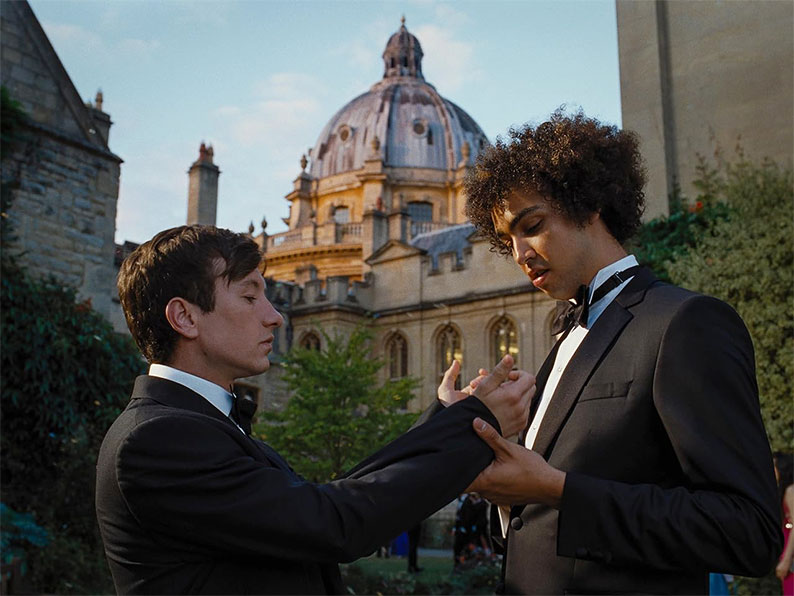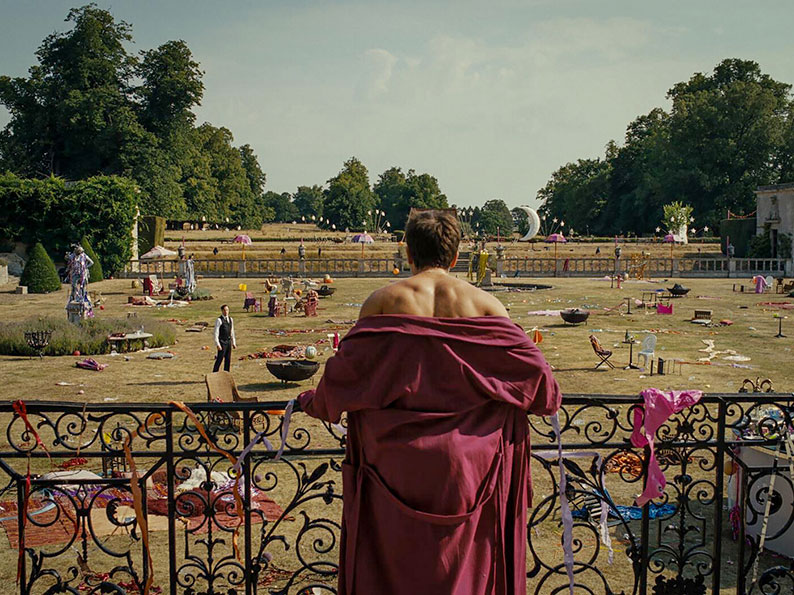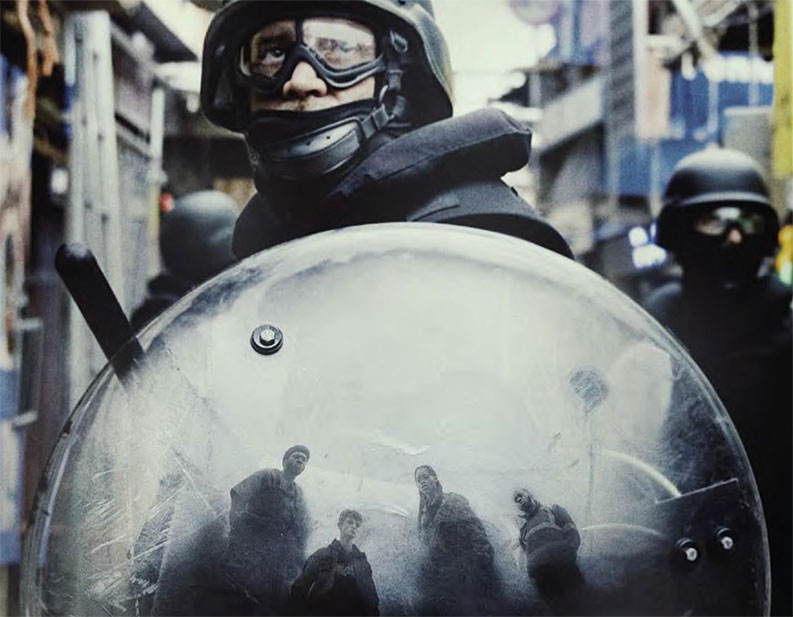|
Hot on the heels of the Hollywood writers' strike, with the Hollywood actors' strike approaching the 100-day mark and production in Los Angeles at a virtual standstill, the 67th London Film Festival provided homegrown talent with an opportunity to showcase their skills as never before. Jonathan Glazer's chilling Holocaust drama The Zone of Interest and Poor Things, Yorgos Lanthimos's adaptation of Alistair Gray's reworking of Mary Shelley's Frankenstein, alone provide proof positive that British cinema, so often accused of timidity, can still throw caution to the wind. Like Ken Loach's fierce swan song The Old Oak, which wasn't submitted for inclusion in the LFF programme, two additional highlights of this year's festival, Saltburn and The Kitchen, confirm that it still has bite and suggest that it is in pretty good shape.
Take a pinch of the finest acting you'll see all year, season with a smidgen of class politics, leaven with audacity and wit, stir in some stunning set design, and you've ingredients aplenty for two delightful dishes. The LFF opened with the spicey tang of Saltburn and closed with the satisfying zest of The Kitchen. Superficially, the two films couldn't be more different: the former being set in the recent past on an opulent country estate, the latter in the near-future on a run-down council estate; the former confidently ablaze with sumptuous saturated colour, the latter darkened by a more muted palate. Their elective affinities, though, lean toward indignant protest against the ruling dispensation and both films pick at the raw wounds inflicted by the British class system, albeit from opposite ends of the spectrum of inequality. Together they present an unanswerable case for root and branch change.
Emerald Fennell had the world at her feet long before she won an Oscar for her debut feature Promising Young Woman – and not just because she's a preternaturally talented workaholic who'd already established herself as a successful actress, novelist, television showrunner and scriptwriter. Born with a silver spoon in her mouth, the daughter of Old Etonian society jeweller Theo and socialite-turned-author Louise Fennell, sister of designer Coco Fennell, she was schooled at Marlborough College and Oxford. She secured the country house location essential to Saltburn's success by 'putting the word out' among her set, and then further capitalised on her inherited advantages by persuading family friend Richard E. Grant to join a stellar cast that knocks our socks off.
In this exhilarating, often devilishly dark burlesque Fennell revisits her alma mater and haute-bourgeois background, possibly her family, certainly her extensive experience of period drama, to turn that hackneyed genre inside out with a lick and a smear of indecorous sex. Fresh from her cameo in Barbie, Fennel here returns to the spectacular. Given her broad brush work on television drama, it is perhaps inevitable that there is an element of caricature and cliché on display, but the unbridled enthusiasm with which Fennell spatters her canvas with paint is irresistibly infectious. She deploys all her fine-tuned storytelling skills as she channels and reworks a few choice works – most obviously Brideshead Revisited and The Talented Mr Ripley but also The Great Gatsby, Kind Hearts and Coronets, The Riot Club, Six Degrees of Separation and Theorem. And why should she not? What her film lacks in originality (and psychological depth), it more than makes up for with superlative performances, stylish set pieces and wicked wit.

Saltburn revolves around likely lad Oliver Quick (Barry Keogh), a not-so innocent operator with his eyes on the prize. An outsider and a loner, he is determined to go far and willing to go way too far to achieve his ends. Newly arrived at Oxford from Merseyside on a scholarship, he's a fish out of water among the entitled, often titled proto-plutocrats on campus. Consequently, he initially, if reluctantly pairs up with fellow misfit autistic maths prodigy Michael Gavey (Ewan Mitchell). Oliver is a cut above Michael though and snubs him as soon as he has penetrated the charmed inner circle of amiable, dashingly handsome Felix Catton (Jacob Elordi). Oliver is drawn to the louche, lanky son of the landed gentry and gradually develops an unhealthy obsession with him. He gains Felix's gratitude by lending him his bike, earns his sympathy with sob stories about his deceased father and alcoholic mother, and, finally, secures an invitation to spend summer with Felix at the opulent family estate.
Of course, class, like beauty and sex appeal, is largely in the eyes of the beholder. It exists as much in our heads as our social structures, so audiences will react to the film according to their own perspectives and positions. At first Fennell invites us to side with Oliver by presenting him as something of a working-class hero and, as John Lennon said, that's a badge of honour: 'There's room at the top they are telling you still/But first you must learn how to smile as you kill/If you want to be like the folks on the hill/A working-class hero is something to be.'
We feel for lonely ostracised Oliver in his awkward early days at Oxford. And we fear for him upon his arrival at Saltburn as he adjusts to the demands of etiquette and the dangers of the Cattons' uproariously catty conversation. He soon has their measure though. While continuing to trade on the prejudices of the class he wishes to infiltrate, he gradually and systematically endears himself to Felix's brittle, unintentionally hilarious mother, Elspeth (Rosamund Pike); absent-minded father, Sir James (Richard E. Grant); and unstable 'sexually incontinent' sister Venetia (Alison Oliver). Oliver will stop at nothing to achieve his ends – mere acceptance initially, and then much more.
Even as Oliver's low cunning helps him win friends and influence at Saltburn, we continue to fear for him. He isn't the first stray Felix has dragged back to Saltburn and Fennell insinuates unease that Oliver's new-found friend might quickly tire of him. The Cattons have, after all, already discarded another stray, Elspeth's 'friend', rehab regular 'Poor Dear Pamela' (Cary Mulligan). They can't wait to get rid of her and warm, disingenuously, to her idea she might find a flat of her own. When she eventually commits suicide, Elspeth shows no sympathy and callously says, 'She'd do anything for attention.' Hardly endearing.
Neither Elspeth nor Sir James endear themselves to us, either, when she asks him, 'Darling, where's Liverpool? It's on the sea, isn't it?' 'North', he replies. Amusing, perhaps, but callous, again, especially so given Britain's spatial inequalities, the power of the City-Westminster nexus and Whitehall's abandonment of the North, the prioritization of finance capitalism over manufacturing and the North's consequent continuing decline. The Cattons wilful ignorance invites us to dislike them and Fennell even has a dig at class tourism: when the Cattons discuss Pulp's 'Common People', Elspeth implies she might have been its inspiration, but finally says, 'She came from Greece, she had a thirst for knowledge? I never wanted to know anything!' Again, we wince as we laugh.

Like Dorothy Parker, Fennell is a doyen of stinging one-liner, but, like Mary Antoinette, she wants to have her cake and to eat it. Too fond of the foibles of those she knows best, too removed from the lives of we, the rest, she can only sketch caricatures. Oliver is a man of many masks, and he's seldom what he seems to be, so we grow to distrust him. Fennell further stacks the deck by presenting spoilt brat Felix as a loveable rascal and by feeding Elspeth the film's best lines. Despite this, our sympathies remain with Oliver, partly because we see unfolding events through his eyes, partly because we know the deck was stacked against him (and us) from the start. Felix is too-cool-for-school, and Oliver's Saltburn hosts are too-posh-to-wash, so we continue to side with him.
At Saltburn, he has to box clever because the Cattons' loyal butler Duncan (Paul Rhys) smells a rat. Felix's cousin Farleigh (Archie Madekwe) is another fly in Oliver's ointment – a wary, watchful presence keen to safeguard his position as a Catton family favourite and beneficiary of their increasingly impatient largesse. Things come to a head when Felix kindly drives Oliver to his parents' house and spiral further out of control at a spectacular masked ball the Cattons throw in honour of Oliver's birthday. Saltburn builds to an astonishing climax that many will see coming but which cannot be faulted for sheer chutzpah. Again, reaction to that ending will depend on our individual class prejudices.
Finally given the lead role he deserved for his great work on The Killing of a Sacred Deer, Black '47 and The Banshees of Inisherin, Barry Keogh delivers one of the year's most powerfully engaged performances. By turns beguiling and brutish, polished and robust, subtle and grotesque, it is a spellbinding tour de force. Only Emily Stone in Poor Things comes close to matching Keogh for no-holes-barred, bare-arsed brio and physical intensity. If Keogh nails Oliver's unusual blend of vulnerable inscrutability and brooding menace, Rosamund Pike perfectly personifies Elspeth's tart vapidity and refined insouciance. Without Keogh and Pike, Saltburn would have collapsed. For all Fennell's fearless invention and salty one-liners, she relies too heavily upon them to carry a film too heavily reliant on contrivance, convenience and pastiche. Saltburn is an exhilarating ride and an absolute hoot nonetheless, and we're left eager to see what delicious confection Fennell cooks up next.
Even before Daniel Kaluuya popped an Oscar on his mantlepiece for his portrayal of Fred Hampton in Judas and the Black Messiah, he had earned an enviable reputation as a brilliant actor in Black Panther, Get Out, and Widows. With The Kitchen he now puts down his marker as a director of extraordinary promise. Co-directed with architect-turned-filmmaker Kibwe Tavares and co-written with Joe Murtagh (who worked with Barry Keogh on American Animals and Calm with Horses), it is an astonishingly mature and measured directorial debut. Three astute minds ensure The Kitchen sensibly sidestep sensationalism and sentimentalism to elevate this compelling, quietly moving tale of male bonding and social disintegration to impressive heights.
The near future. London. The embattled working-class community of the Kitchen, one of the city's last remaining council estates, stand together. Hemmed in by boxy 'luxury appartements', they are doggedly holding out against city-wide gentrification and social cleansing, despite police raids and institutional heartlessness, the severing of their basic amenities and the absence of alternative accommodation. Cynical, taciturn bikerider Izi (Kane Robinson, better known as Kano) considers the place 'a shithole'. He wants out, has his exit strategy in place, and is saving for a place in a shiny new complex called Buena Vista. He feels resistance is futile.

It is unsurprising that Izi chooses to look after number one and focus on his soul-destroying work at Life After Life – an ecological funeral service that riffs on woodland burials and promises to turn loved ones into trees. Without being at all didactic and with restrained anger, The Kitchen critiques the surveillance society and presupposes the kind of catastrophic housing crisis we're currently experiencing. It unfolds against the backdrop of deliberately diminished public housing availability and an expanded private property sector, a society of property haves and have-nots, a dog-eat-dog world in which rising rents and house prices, and the unceasing hardscrabble competition for scarce affordable homes breed fear and insecurity, forcing folk to get by at the expense of others.
Which is to say, an unjust society in which profits are privatised while risks are nationalised, in which public buildings and public housing crumble while buy-to-let landlords profit from misery, millions live in sub-standard, often dangerous accommodation, and untold numbers of working-class Londoners have been forced out of their native city. Although The Kitchen warns us what London might become if we let it, a frightening future that chimes with the cruel present that is already on our doorstep. Such divisive social realities are just one of the reasons The Kitchen resonates so powerfully and feels so vital.
With subtlety and soul, Kaluuya also reminds us of the unfashionable virtues of cultural bravery, civic responsibility and human solidarity. Izi may be battled-hardened but he's given up the ghost. His best mate Jase (Demmy Lapido) and most of the residents of the Kitchen refuse to give up hope and give in to the intimidation and violence of authority. They organise for self-defence, bang pots and pans to warn of raids, take catapult pot shots at police surveillance drones, and bolt behind their reinforced doors quick-fast when the police invade their space.
As they defend their homes, the community D.J. Lord Kitchener (delightfully played by football legend Ian 'Wrighty' Wright) keeps the residents of the Kitchen informed and keeps their spirits up. It was almost as inspired a casting decision as the one that granted renowned rapper Kano the lead role he assuredly makes his own. Kaluuya resists the temptation to put Kano on the mic and frees him up to develop his character with understated intensity. His inscrutable face gives little away so we must second-guess his innermost thoughts. Hope Ikpoku Jnr is equally impressive as Staples, a Robin Hood homeboy who organises the community's resistance and hijacks delivery vans to redistribute wealth.
While Staples marshals his merry men, Izi keeps his head down and keeps himself to himself. Until, that is, his job at Life After Life places him in the orbit of his ex-partner's bereaved teenage son, Benji (another standout performance by debutant Jedaiah Bannerman). The newly homeless orphan's predicament gradually gets under Izi's skin and softens his hardened heart. He urges Benji to steer clear of Staples, whose physical force idealism he distrusts and who he fears spells trouble. Staples also offers Benji a home and a tug-of-war between him and Izi ensues. An unspoken and touching bond of mutual affection and trust gradually develops between Izi and Benji, loners both. There are moments of real tenderness and humour between them as their relationship deepens. A ride on Izi's bike, a trip to a roller skate rink, the purchase of a kitsch lamp – the small shared moments are elegantly executed and bubble up with tender humane humour. The big questions remain: will the Kitchen hold out and is Izi Benji's father or Izi not?

Both The Kitchen and George Amponsah's high-octane debut feature, Gassed Up, premiered at the LFF and, refreshingly, boast predominantly Black casts. Both operate as teenage tearaway redemption stories and feature a stabilising role model keeping a vulnerable kid on track. While Amponsah's gutsy film is buried beneath layers of cliché though, Kaluuya and co. assiduously avoid them. Izi and Benji feel each other out warily, with glances and gestures. It's all in the eyes and the body language, the immaculate timing and Daniel Kaluuya's deft, sure-footed direction.
Kaluuya and, presumably particularly Tavares create an ingeniously imagined dystopian London of the future that we can imagine only too well. Their London is insistently recognisable and at the same time disconcertingly other-worldly, for the city's skyline has altered. They fill the screen with the kind of cheaply constructed, overpriced glass-fronted boxy blocks that will be our generation's architectural legacy (glass being a far cheaper, more profitable building material than concrete, brick and wood). We all recognise such buildings and Londoners, at least, will instantly recognise the bustling market that lies at the warm beating heart of the Kitchen's close-knit community (think the new Lewisham and old Tooting Market). They make effective use of the atrium and walkways of the Barbican Centre and based their coherent design vision for the Kitchen on the Damiers de Daphiné in Paris, La Defénce – a modernist development that is, like the Kitchen, marked down for demolition.
Delicately steering a balanced course between the familiar and the strange, Daniel Kaluuya, Kibwe Tavares, Joe Murtagh and production designer Nathan Parker have achieved an impeccably realised, completely convincing vision of where we're heading that simultaneously chimes with the hostile political environment and housing crisis of the moment. As Danny Dorling says, if people hoarded food in the certainty prices would rise while others starved and would pay any price to satisfy their basic needs, we'd put a stop to it, but the hoarding of houses is allowed to continue unabated. This is the sorry state of affairs Kaluuya and co. challenge, even as they warn us things could get even worse. The Kitchen urges us to make common cause with the besieged residents of its titular estate. It calls on us to resist being taken for a ride to the dark place that lies ahead if we doze.
|